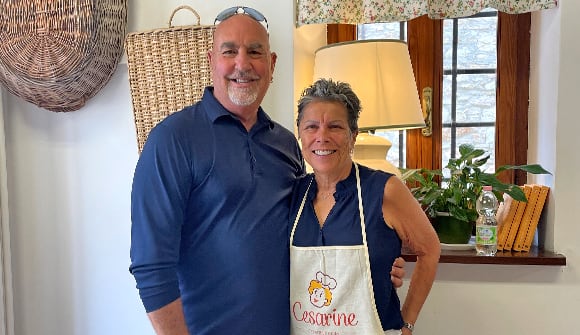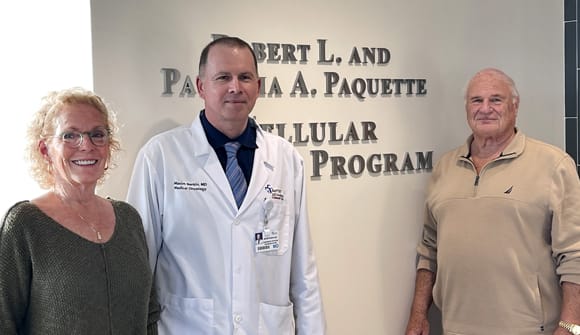Pancreatic cancer fact-check
6 myths about this poorly understood disease.
Article Date:

When you hear "pancreatic cancer," there's a tendency to think the worst. It's often advanced before it's detected, but medical developments are allowing doctors to do more to find and fight it earlier.
Pancreatic cancer starts in the pancreas, an organ that sits in the back of the abdomen behind the stomach and produces two major things: insulin and other hormones that help with sugar control, and digestive enzymes that flow through a series of ducts to the intestines to help digest fatty foods.
The third-leading cause of cancer death in America, the disease is slightly more common in men than women. Each year, more than 60,000 people in the United States are diagnosed.
6 myths about pancreatic cancer
Niraj Gusani, MD, a surgical oncologist at Baptist MD Anderson Cancer Center, shared the truth behind six common pancreatic cancer myths.
Myth 1: Only people with a family history of pancreatic cancer get it.
Truth: “Most cases are sporadic and don’t result from a genetic predisposition to the disease, meaning most commonly, no one else in the person’s family has had pancreatic cancer,” said Dr. Gusani. “Common risk factors include advanced age, smoking, diabetes and obesity.”
That said, there are a few familial or genetic syndromes that predispose a person to pancreatic cancer, so if cancers run in your family, it’s important to talk to your primary care doctor. Additionally, anyone who has been diagnosed with pancreatic cancer should consider genetic evaluation to see if there's a higher likelihood of this disease in their family.
Myth 2: There is only one kind of pancreatic cancer.
Truth: There are several subtypes of pancreatic cancer. Different cells make up the pancreas and each of these can become a cancerous tumor. The most common type of pancreatic cancer is pancreatic ductal cancer, or adenocarcinoma, which stems from the gland and duct cells of the organ. The other major type is a neuroendocrine tumor, which arises from the nerve and hormone cells.
Celebrities who have been diagnosed with pancreatic adenocarcinoma include Alex Trebek, Aretha Franklin, Ruth Bader Ginsburg, Patrick Swayze, Pavarotti and Jerry Springer. Those who have had neuroendocrine tumors include Steve Jobs and Maria Menounos.
Myth 3: You can get screened for pancreatic cancer.
Truth: Unfortunately, there are no screening tests for pancreatic cancer.
“Researchers are actively trying to develop these tools, but we currently don’t have a way to look at the average person and know whether he or she has pancreatic cancer,” Dr. Gusani said.
In certain high-risk populations, like those with a genetic predisposition to developing the disease (African Americans and Ashkenazi Jews), advanced imaging studies can be done to look for early-stage cancers. Also, if you have new-onset diabetes with weight loss, you may be considered for pancreatic cancer evaluation.
"It’s not uncommon for patients to be diagnosed with a pancreatic cyst," said Dr. Gusani. "Most of these are benign, but a small percentage can grow and become cancerous. Through monitoring and screening, we can often detect changes before they turn into cancer. In fact, we see so many of these patients that Baptist MD Anderson has developed a Pancreatic Cyst Clinic for evaluation and surveillance of patients with this issue."
Myth 4: All pancreatic cancer is treated the same way.
Truth: Just as every patient is unique, pancreatic cancers have their own distinct elements and can be treated in a variety of ways. For patients with pancreatic adenocarcinoma confined to the organ, treatment includes a combination of chemotherapy and surgery, sometimes adding radiation to the mix.
“We are moving the chemotherapy upfront more and waiting to do surgery after treating and hopefully shrinking the tumor,” Dr. Gusani said. “For advanced forms where the disease has spread to other organs, we generally only do chemotherapy. Even then, there are several different regimens and new drugs being tested and approved all the time.”
Myth 5: Surgery will make the cancer spread.
Truth: It's a common myth that any type of surgery will result in the spread of cancer because of air hitting the tumor.
“This is not true, and the reason this is so commonly believed is that cancer can spread insidiously, often getting into the blood or belly cavity (peritoneum) very early in the course of the disease. Too often, it spreads into these areas in the form of small tumors all around, which are very hard to detect by the usual tests, such as CT scans, MRIs or PET scans. We often find spread of tumors during or after surgery because our eyes and cameras are better at detecting these things than imaging studies. But these tumors were probably present and growing all along.”
Myth 6: Pancreatic cancer isn’t treatable.
Truth: “Unfortunately, the overall prognosis is poor, which has led to a lot of skepticism and negativity in the general public and medical community,” Dr. Gusani said. “People think the treatments are worse than the disease itself and there are no good choices, but that’s not true. At every stage, we can offer options to treat the disease, improve symptoms and often prolong survival. Patients should seek options and get an opinion about which approach is right for them. There are more treatments available today and doctors can often cure pancreatic cancer when found at early stages."
How can you reduce your risk? Stop smoking, eat a diet full of fruits, vegetables and whole grains, and maintain a healthy weight.
Treating pancreatic cancer at Baptist MD Anderson Cancer Center
If you have unexplained symptoms that concern you, talk to your primary care physician. If you or a loved one needs a cancer specialist, call 904.202.7300 or visit baptistmdanderson.com.




